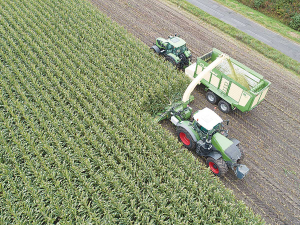Krone unveils new CombiPack HDP baler and halts US exports
Well-known for an extensive range of round balers, Krone’s new CombiPack HDP looks to have several features that sets it apart from its competitors.
 Krone has developed a prototype reverse-drive forage harvester that has been undergoing testing in maize.
Krone has developed a prototype reverse-drive forage harvester that has been undergoing testing in maize.
Anyone familiar with precision grass harvesting will remember the domination of the drum-type trailed harvesters of the 1980s and ‘90s.
This was overtaken by the popularity of flywheel type machines, which delivered more output, less fuel consumption and a better chance of surviving foreign object ingestion.
Those flywheel-based machines evolved from rear-linkage mounted, reverse drive machines that were the norm when forage maize became popular in northern Europe. This was at a time when self-propelled units were only just starting to appear.
German harvesting specialist Krone is now looking to turn the clock back and creating a sense of déjà vu with its latest development project – a prototype reverse-drive forage harvester that has been undergoing testing in maize.
Designed to be mounted on prime mowers like the Claas Xerion 5000 or the Fendt 1050, the prototype weighs over six tonnes and can be equipped with Krone’s six to 10 row maize, conventional grass pick-up or direct-cut, whole-crop headers.
It features a chopping cylinder from the Big-X harvester range, and hydraulically-driven header and feed rollers.
The prototype is said to be a match for Krone’s Big-X 480 cousin in terms of output and chop quality, with reduced fuel consumption and a significantly lower capital cost.
Additional tariffs introduced by the Chinese Government last month on beef imports should favour New Zealand farmers and exporters.
Primary sector leaders have praised the government and its officials for putting the Indian free trade deal together in just nine months.
Primary sector leaders have welcomed the announcement of a Free Trade Agreement (FTA) between India and New Zealand.
Dairy farmers are still in a good place despite volatile global milk prices.
Legal controls on the movement of fruits and vegetables are now in place in Auckland’s Mt Roskill suburb, says Biosecurity New Zealand Commissioner North Mike Inglis.
Arable growers worried that some weeds in their crops may have developed herbicide resistance can now get the suspected plants tested for free.